University of Bedfordshire: Psychology Honours Project Ethics Proposal
VerifiedAdded on 2022/08/28
|16
|3102
|18
Project
AI Summary
This document presents a student's ethics proposal for their psychology honours project, focusing on a quantitative research design to investigate the perceived advantages and disadvantages of positive reinforcement in education. The proposal includes detailed learning objectives, key skills development strategies, and a comprehensive research plan. The theoretical framework is based on B.F. Skinner's operant conditioning and explores the impact of positive reinforcement on student behaviour. The research aims to assess behavioural changes in students across primary, middle, and high school levels through structured psychological tests. The methodology involves dividing students into groups and exposing them to different interventions. The proposal also addresses ethical considerations, including informed consent, participant safety, and data privacy, ensuring adherence to ethical guidelines. A detailed timetable outlines the project's phases from topic selection to final submission. The proposal incorporates information, consent, and debriefing forms to ensure ethical conduct throughout the study.
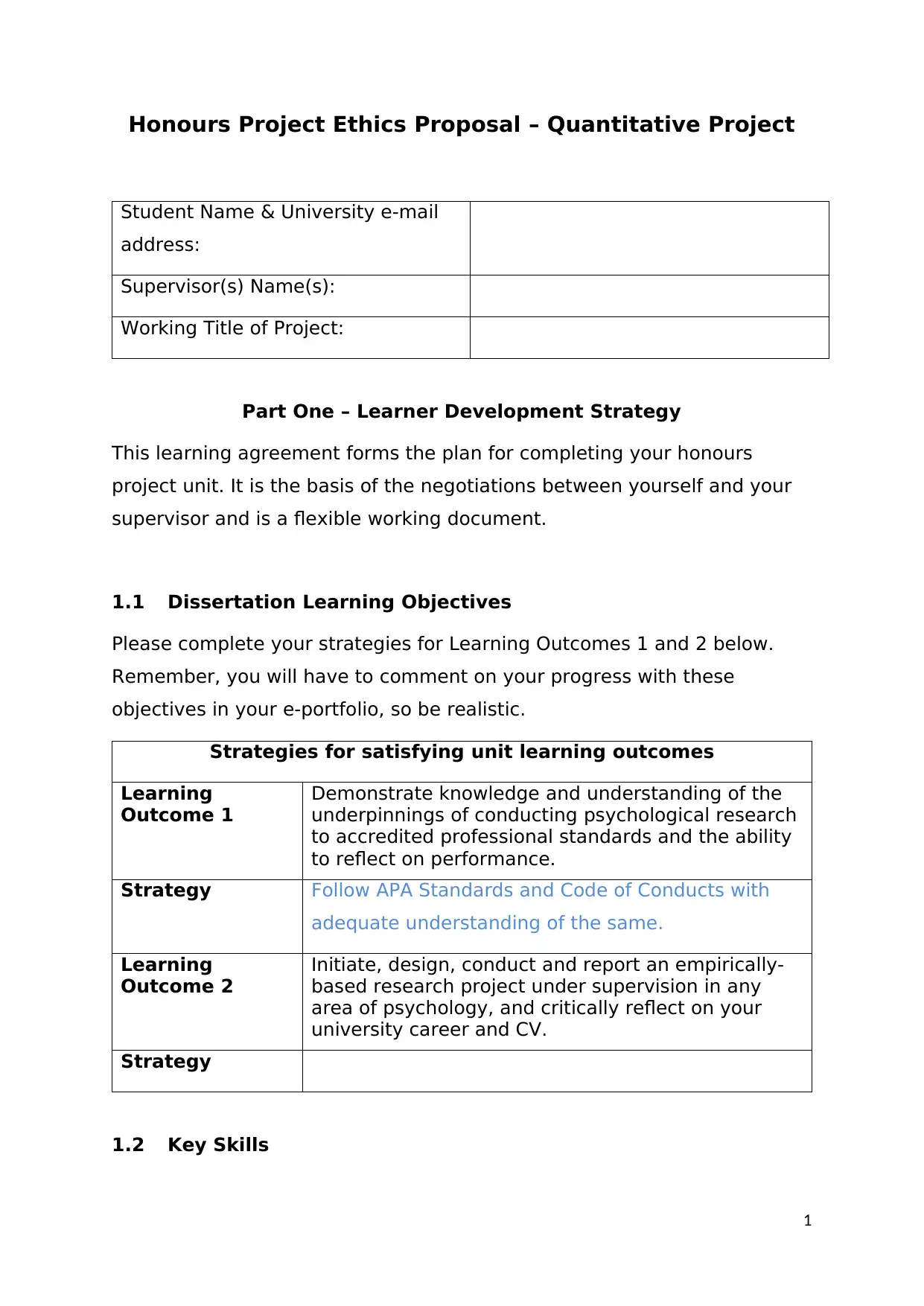
Honours Project Ethics Proposal – Quantitative Project
Student Name & University e-mail
address:
Supervisor(s) Name(s):
Working Title of Project:
Part One – Learner Development Strategy
This learning agreement forms the plan for completing your honours
project unit. It is the basis of the negotiations between yourself and your
supervisor and is a flexible working document.
1.1 Dissertation Learning Objectives
Please complete your strategies for Learning Outcomes 1 and 2 below.
Remember, you will have to comment on your progress with these
objectives in your e-portfolio, so be realistic.
Strategies for satisfying unit learning outcomes
Learning
Outcome 1
Demonstrate knowledge and understanding of the
underpinnings of conducting psychological research
to accredited professional standards and the ability
to reflect on performance.
Strategy Follow APA Standards and Code of Conducts with
adequate understanding of the same.
Learning
Outcome 2
Initiate, design, conduct and report an empirically-
based research project under supervision in any
area of psychology, and critically reflect on your
university career and CV.
Strategy
1.2 Key Skills
1
Student Name & University e-mail
address:
Supervisor(s) Name(s):
Working Title of Project:
Part One – Learner Development Strategy
This learning agreement forms the plan for completing your honours
project unit. It is the basis of the negotiations between yourself and your
supervisor and is a flexible working document.
1.1 Dissertation Learning Objectives
Please complete your strategies for Learning Outcomes 1 and 2 below.
Remember, you will have to comment on your progress with these
objectives in your e-portfolio, so be realistic.
Strategies for satisfying unit learning outcomes
Learning
Outcome 1
Demonstrate knowledge and understanding of the
underpinnings of conducting psychological research
to accredited professional standards and the ability
to reflect on performance.
Strategy Follow APA Standards and Code of Conducts with
adequate understanding of the same.
Learning
Outcome 2
Initiate, design, conduct and report an empirically-
based research project under supervision in any
area of psychology, and critically reflect on your
university career and CV.
Strategy
1.2 Key Skills
1
Paraphrase This Document
Need a fresh take? Get an instant paraphrase of this document with our AI Paraphraser
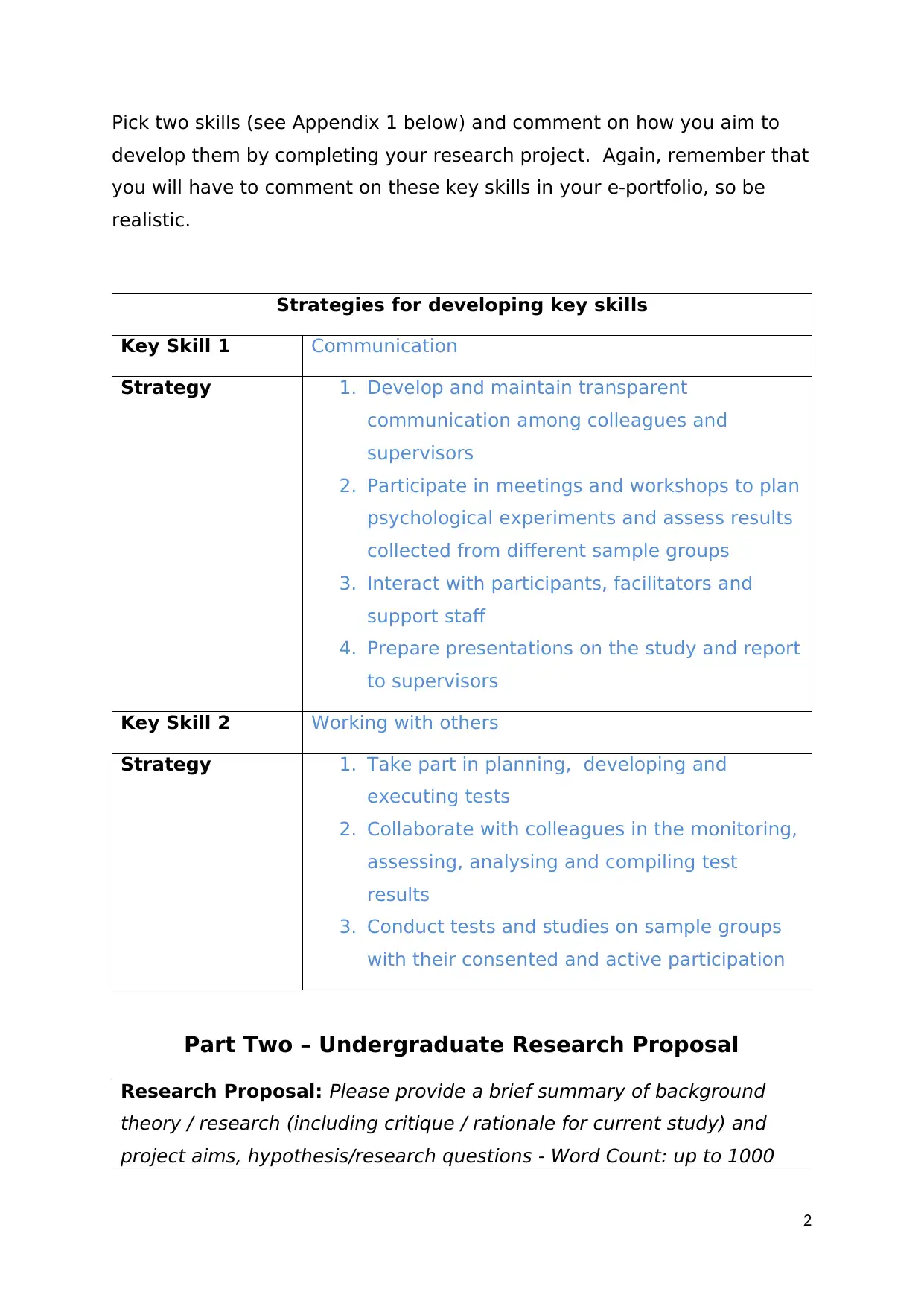
Pick two skills (see Appendix 1 below) and comment on how you aim to
develop them by completing your research project. Again, remember that
you will have to comment on these key skills in your e-portfolio, so be
realistic.
Strategies for developing key skills
Key Skill 1 Communication
Strategy 1. Develop and maintain transparent
communication among colleagues and
supervisors
2. Participate in meetings and workshops to plan
psychological experiments and assess results
collected from different sample groups
3. Interact with participants, facilitators and
support staff
4. Prepare presentations on the study and report
to supervisors
Key Skill 2 Working with others
Strategy 1. Take part in planning, developing and
executing tests
2. Collaborate with colleagues in the monitoring,
assessing, analysing and compiling test
results
3. Conduct tests and studies on sample groups
with their consented and active participation
Part Two – Undergraduate Research Proposal
Research Proposal: Please provide a brief summary of background
theory / research (including critique / rationale for current study) and
project aims, hypothesis/research questions - Word Count: up to 1000
2
develop them by completing your research project. Again, remember that
you will have to comment on these key skills in your e-portfolio, so be
realistic.
Strategies for developing key skills
Key Skill 1 Communication
Strategy 1. Develop and maintain transparent
communication among colleagues and
supervisors
2. Participate in meetings and workshops to plan
psychological experiments and assess results
collected from different sample groups
3. Interact with participants, facilitators and
support staff
4. Prepare presentations on the study and report
to supervisors
Key Skill 2 Working with others
Strategy 1. Take part in planning, developing and
executing tests
2. Collaborate with colleagues in the monitoring,
assessing, analysing and compiling test
results
3. Conduct tests and studies on sample groups
with their consented and active participation
Part Two – Undergraduate Research Proposal
Research Proposal: Please provide a brief summary of background
theory / research (including critique / rationale for current study) and
project aims, hypothesis/research questions - Word Count: up to 1000
2
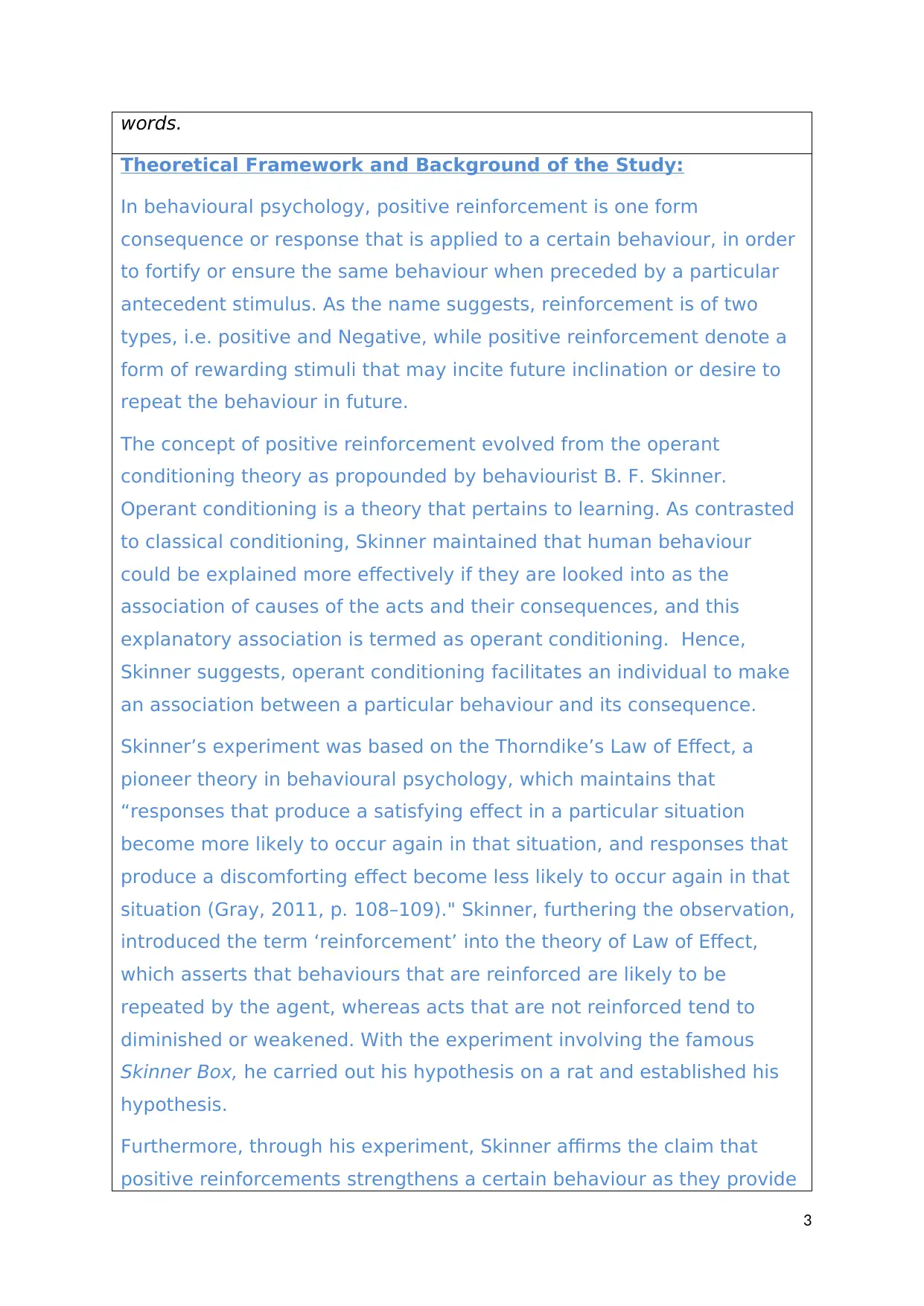
words.
Theoretical Framework and Background of the Study:
In behavioural psychology, positive reinforcement is one form
consequence or response that is applied to a certain behaviour, in order
to fortify or ensure the same behaviour when preceded by a particular
antecedent stimulus. As the name suggests, reinforcement is of two
types, i.e. positive and Negative, while positive reinforcement denote a
form of rewarding stimuli that may incite future inclination or desire to
repeat the behaviour in future.
The concept of positive reinforcement evolved from the operant
conditioning theory as propounded by behaviourist B. F. Skinner.
Operant conditioning is a theory that pertains to learning. As contrasted
to classical conditioning, Skinner maintained that human behaviour
could be explained more effectively if they are looked into as the
association of causes of the acts and their consequences, and this
explanatory association is termed as operant conditioning. Hence,
Skinner suggests, operant conditioning facilitates an individual to make
an association between a particular behaviour and its consequence.
Skinner’s experiment was based on the Thorndike’s Law of Effect, a
pioneer theory in behavioural psychology, which maintains that
“responses that produce a satisfying effect in a particular situation
become more likely to occur again in that situation, and responses that
produce a discomforting effect become less likely to occur again in that
situation (Gray, 2011, p. 108–109)." Skinner, furthering the observation,
introduced the term ‘reinforcement’ into the theory of Law of Effect,
which asserts that behaviours that are reinforced are likely to be
repeated by the agent, whereas acts that are not reinforced tend to
diminished or weakened. With the experiment involving the famous
Skinner Box, he carried out his hypothesis on a rat and established his
hypothesis.
Furthermore, through his experiment, Skinner affirms the claim that
positive reinforcements strengthens a certain behaviour as they provide
3
Theoretical Framework and Background of the Study:
In behavioural psychology, positive reinforcement is one form
consequence or response that is applied to a certain behaviour, in order
to fortify or ensure the same behaviour when preceded by a particular
antecedent stimulus. As the name suggests, reinforcement is of two
types, i.e. positive and Negative, while positive reinforcement denote a
form of rewarding stimuli that may incite future inclination or desire to
repeat the behaviour in future.
The concept of positive reinforcement evolved from the operant
conditioning theory as propounded by behaviourist B. F. Skinner.
Operant conditioning is a theory that pertains to learning. As contrasted
to classical conditioning, Skinner maintained that human behaviour
could be explained more effectively if they are looked into as the
association of causes of the acts and their consequences, and this
explanatory association is termed as operant conditioning. Hence,
Skinner suggests, operant conditioning facilitates an individual to make
an association between a particular behaviour and its consequence.
Skinner’s experiment was based on the Thorndike’s Law of Effect, a
pioneer theory in behavioural psychology, which maintains that
“responses that produce a satisfying effect in a particular situation
become more likely to occur again in that situation, and responses that
produce a discomforting effect become less likely to occur again in that
situation (Gray, 2011, p. 108–109)." Skinner, furthering the observation,
introduced the term ‘reinforcement’ into the theory of Law of Effect,
which asserts that behaviours that are reinforced are likely to be
repeated by the agent, whereas acts that are not reinforced tend to
diminished or weakened. With the experiment involving the famous
Skinner Box, he carried out his hypothesis on a rat and established his
hypothesis.
Furthermore, through his experiment, Skinner affirms the claim that
positive reinforcements strengthens a certain behaviour as they provide
3
⊘ This is a preview!⊘
Do you want full access?
Subscribe today to unlock all pages.

Trusted by 1+ million students worldwide
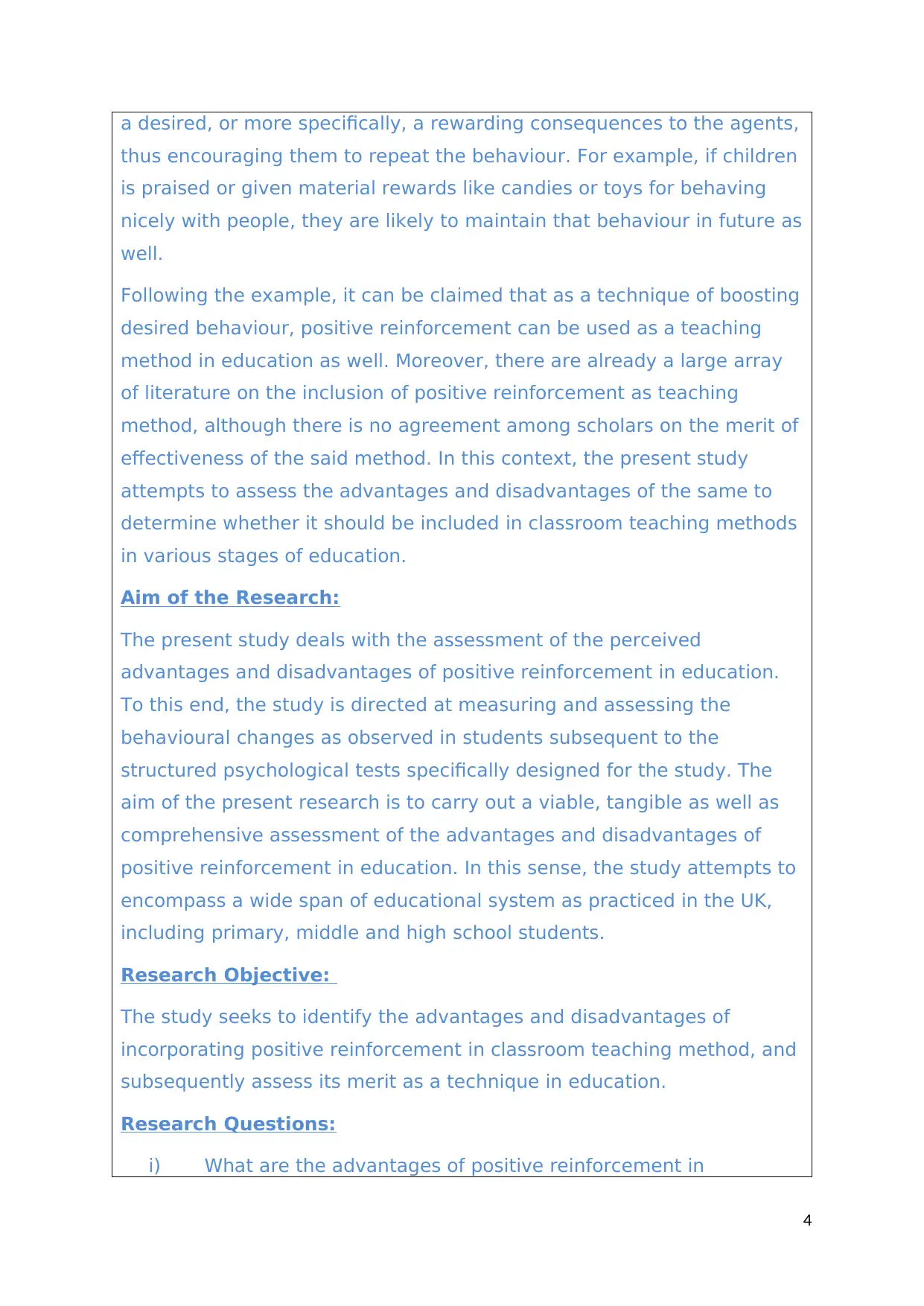
a desired, or more specifically, a rewarding consequences to the agents,
thus encouraging them to repeat the behaviour. For example, if children
is praised or given material rewards like candies or toys for behaving
nicely with people, they are likely to maintain that behaviour in future as
well.
Following the example, it can be claimed that as a technique of boosting
desired behaviour, positive reinforcement can be used as a teaching
method in education as well. Moreover, there are already a large array
of literature on the inclusion of positive reinforcement as teaching
method, although there is no agreement among scholars on the merit of
effectiveness of the said method. In this context, the present study
attempts to assess the advantages and disadvantages of the same to
determine whether it should be included in classroom teaching methods
in various stages of education.
Aim of the Research:
The present study deals with the assessment of the perceived
advantages and disadvantages of positive reinforcement in education.
To this end, the study is directed at measuring and assessing the
behavioural changes as observed in students subsequent to the
structured psychological tests specifically designed for the study. The
aim of the present research is to carry out a viable, tangible as well as
comprehensive assessment of the advantages and disadvantages of
positive reinforcement in education. In this sense, the study attempts to
encompass a wide span of educational system as practiced in the UK,
including primary, middle and high school students.
Research Objective:
The study seeks to identify the advantages and disadvantages of
incorporating positive reinforcement in classroom teaching method, and
subsequently assess its merit as a technique in education.
Research Questions:
i) What are the advantages of positive reinforcement in
4
thus encouraging them to repeat the behaviour. For example, if children
is praised or given material rewards like candies or toys for behaving
nicely with people, they are likely to maintain that behaviour in future as
well.
Following the example, it can be claimed that as a technique of boosting
desired behaviour, positive reinforcement can be used as a teaching
method in education as well. Moreover, there are already a large array
of literature on the inclusion of positive reinforcement as teaching
method, although there is no agreement among scholars on the merit of
effectiveness of the said method. In this context, the present study
attempts to assess the advantages and disadvantages of the same to
determine whether it should be included in classroom teaching methods
in various stages of education.
Aim of the Research:
The present study deals with the assessment of the perceived
advantages and disadvantages of positive reinforcement in education.
To this end, the study is directed at measuring and assessing the
behavioural changes as observed in students subsequent to the
structured psychological tests specifically designed for the study. The
aim of the present research is to carry out a viable, tangible as well as
comprehensive assessment of the advantages and disadvantages of
positive reinforcement in education. In this sense, the study attempts to
encompass a wide span of educational system as practiced in the UK,
including primary, middle and high school students.
Research Objective:
The study seeks to identify the advantages and disadvantages of
incorporating positive reinforcement in classroom teaching method, and
subsequently assess its merit as a technique in education.
Research Questions:
i) What are the advantages of positive reinforcement in
4
Paraphrase This Document
Need a fresh take? Get an instant paraphrase of this document with our AI Paraphraser
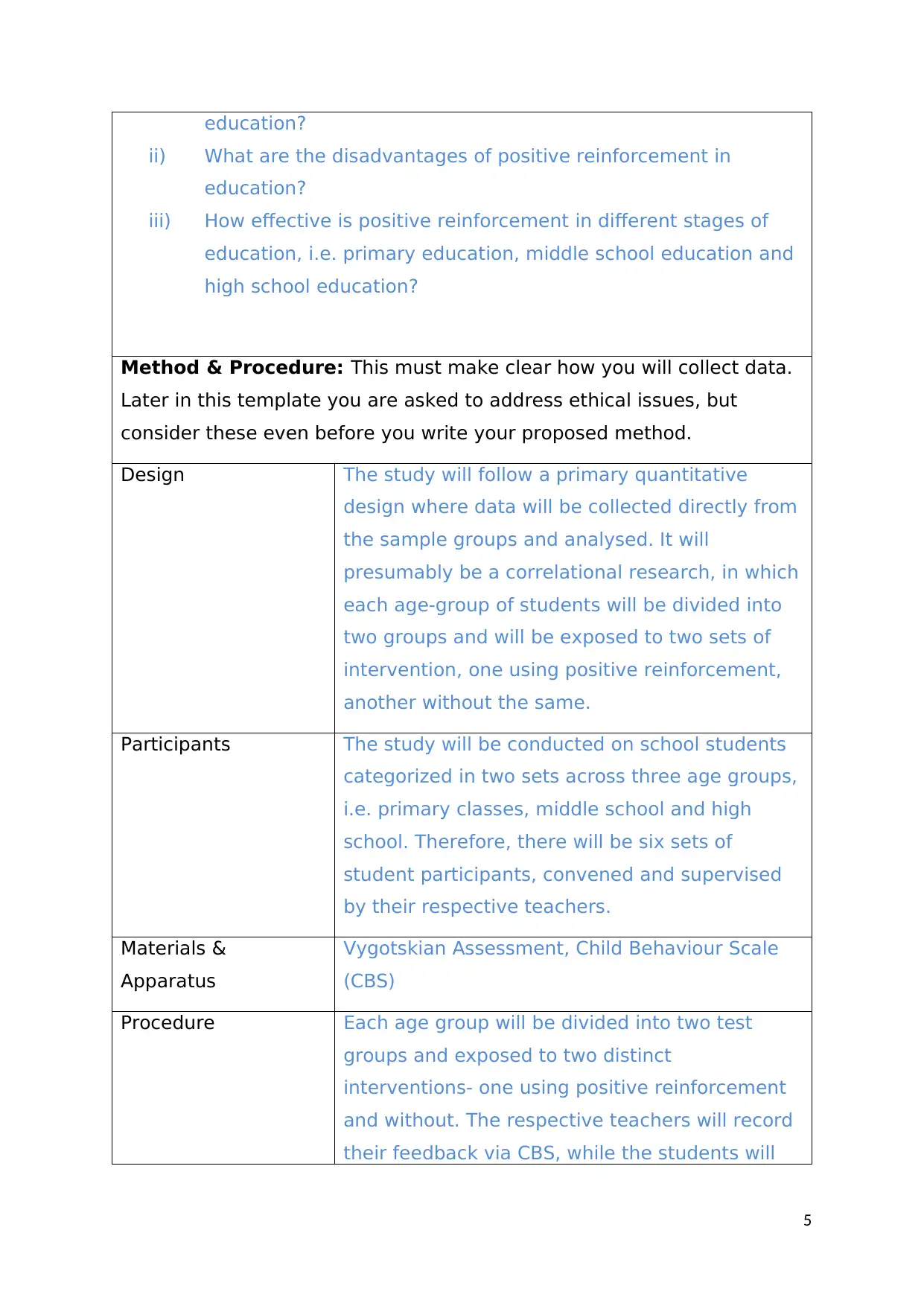
education?
ii) What are the disadvantages of positive reinforcement in
education?
iii) How effective is positive reinforcement in different stages of
education, i.e. primary education, middle school education and
high school education?
Method & Procedure: This must make clear how you will collect data.
Later in this template you are asked to address ethical issues, but
consider these even before you write your proposed method.
Design The study will follow a primary quantitative
design where data will be collected directly from
the sample groups and analysed. It will
presumably be a correlational research, in which
each age-group of students will be divided into
two groups and will be exposed to two sets of
intervention, one using positive reinforcement,
another without the same.
Participants The study will be conducted on school students
categorized in two sets across three age groups,
i.e. primary classes, middle school and high
school. Therefore, there will be six sets of
student participants, convened and supervised
by their respective teachers.
Materials &
Apparatus
Vygotskian Assessment, Child Behaviour Scale
(CBS)
Procedure Each age group will be divided into two test
groups and exposed to two distinct
interventions- one using positive reinforcement
and without. The respective teachers will record
their feedback via CBS, while the students will
5
ii) What are the disadvantages of positive reinforcement in
education?
iii) How effective is positive reinforcement in different stages of
education, i.e. primary education, middle school education and
high school education?
Method & Procedure: This must make clear how you will collect data.
Later in this template you are asked to address ethical issues, but
consider these even before you write your proposed method.
Design The study will follow a primary quantitative
design where data will be collected directly from
the sample groups and analysed. It will
presumably be a correlational research, in which
each age-group of students will be divided into
two groups and will be exposed to two sets of
intervention, one using positive reinforcement,
another without the same.
Participants The study will be conducted on school students
categorized in two sets across three age groups,
i.e. primary classes, middle school and high
school. Therefore, there will be six sets of
student participants, convened and supervised
by their respective teachers.
Materials &
Apparatus
Vygotskian Assessment, Child Behaviour Scale
(CBS)
Procedure Each age group will be divided into two test
groups and exposed to two distinct
interventions- one using positive reinforcement
and without. The respective teachers will record
their feedback via CBS, while the students will
5
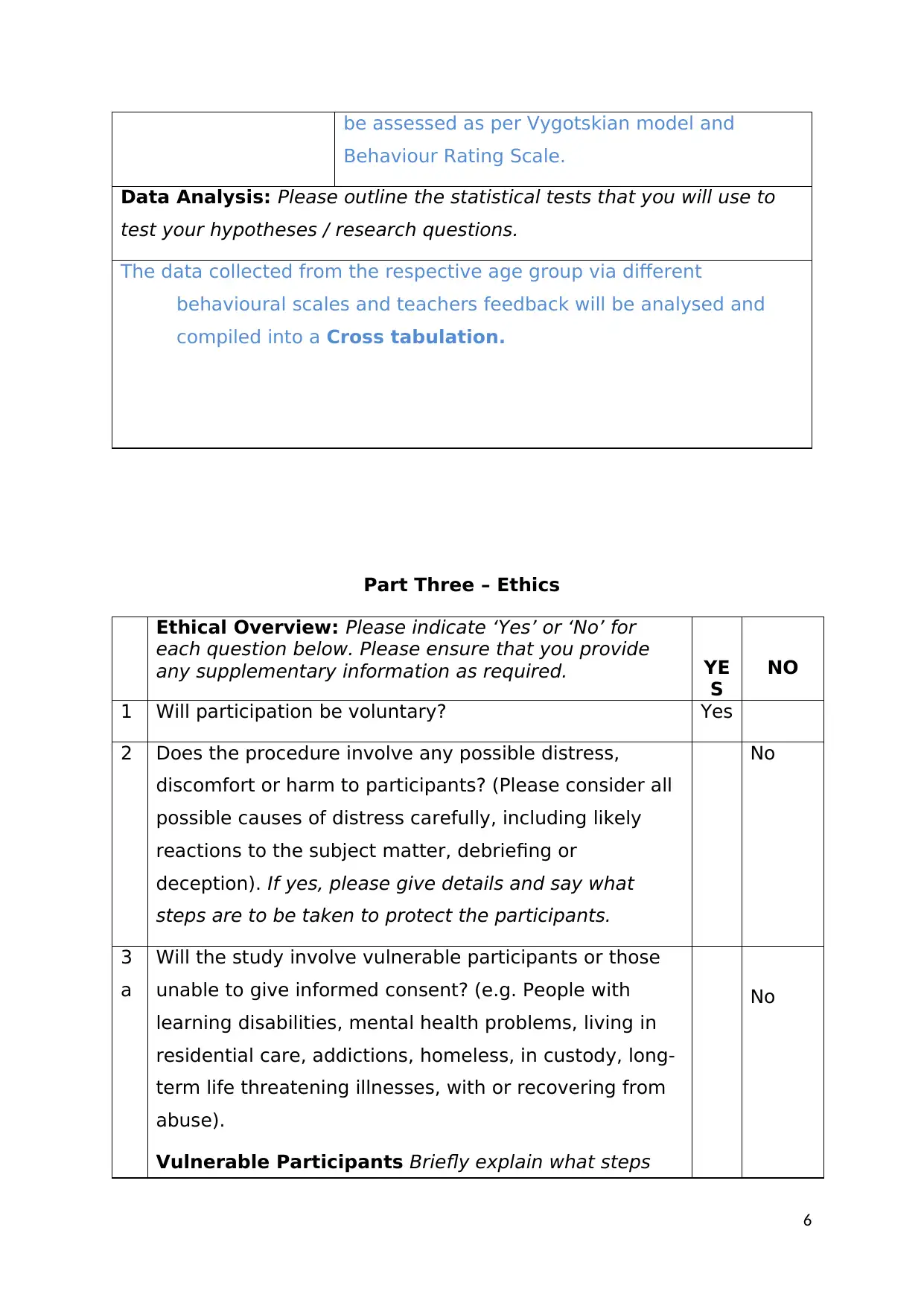
be assessed as per Vygotskian model and
Behaviour Rating Scale.
Data Analysis: Please outline the statistical tests that you will use to
test your hypotheses / research questions.
The data collected from the respective age group via different
behavioural scales and teachers feedback will be analysed and
compiled into a Cross tabulation.
Part Three – Ethics
Ethical Overview: Please indicate ‘Yes’ or ‘No’ for
each question below. Please ensure that you provide
any supplementary information as required. YE
S
NO
1 Will participation be voluntary? Yes
2 Does the procedure involve any possible distress,
discomfort or harm to participants? (Please consider all
possible causes of distress carefully, including likely
reactions to the subject matter, debriefing or
deception). If yes, please give details and say what
steps are to be taken to protect the participants.
No
3
a
Will the study involve vulnerable participants or those
unable to give informed consent? (e.g. People with
learning disabilities, mental health problems, living in
residential care, addictions, homeless, in custody, long-
term life threatening illnesses, with or recovering from
abuse).
Vulnerable Participants Briefly explain what steps
No
6
Behaviour Rating Scale.
Data Analysis: Please outline the statistical tests that you will use to
test your hypotheses / research questions.
The data collected from the respective age group via different
behavioural scales and teachers feedback will be analysed and
compiled into a Cross tabulation.
Part Three – Ethics
Ethical Overview: Please indicate ‘Yes’ or ‘No’ for
each question below. Please ensure that you provide
any supplementary information as required. YE
S
NO
1 Will participation be voluntary? Yes
2 Does the procedure involve any possible distress,
discomfort or harm to participants? (Please consider all
possible causes of distress carefully, including likely
reactions to the subject matter, debriefing or
deception). If yes, please give details and say what
steps are to be taken to protect the participants.
No
3
a
Will the study involve vulnerable participants or those
unable to give informed consent? (e.g. People with
learning disabilities, mental health problems, living in
residential care, addictions, homeless, in custody, long-
term life threatening illnesses, with or recovering from
abuse).
Vulnerable Participants Briefly explain what steps
No
6
⊘ This is a preview!⊘
Do you want full access?
Subscribe today to unlock all pages.

Trusted by 1+ million students worldwide
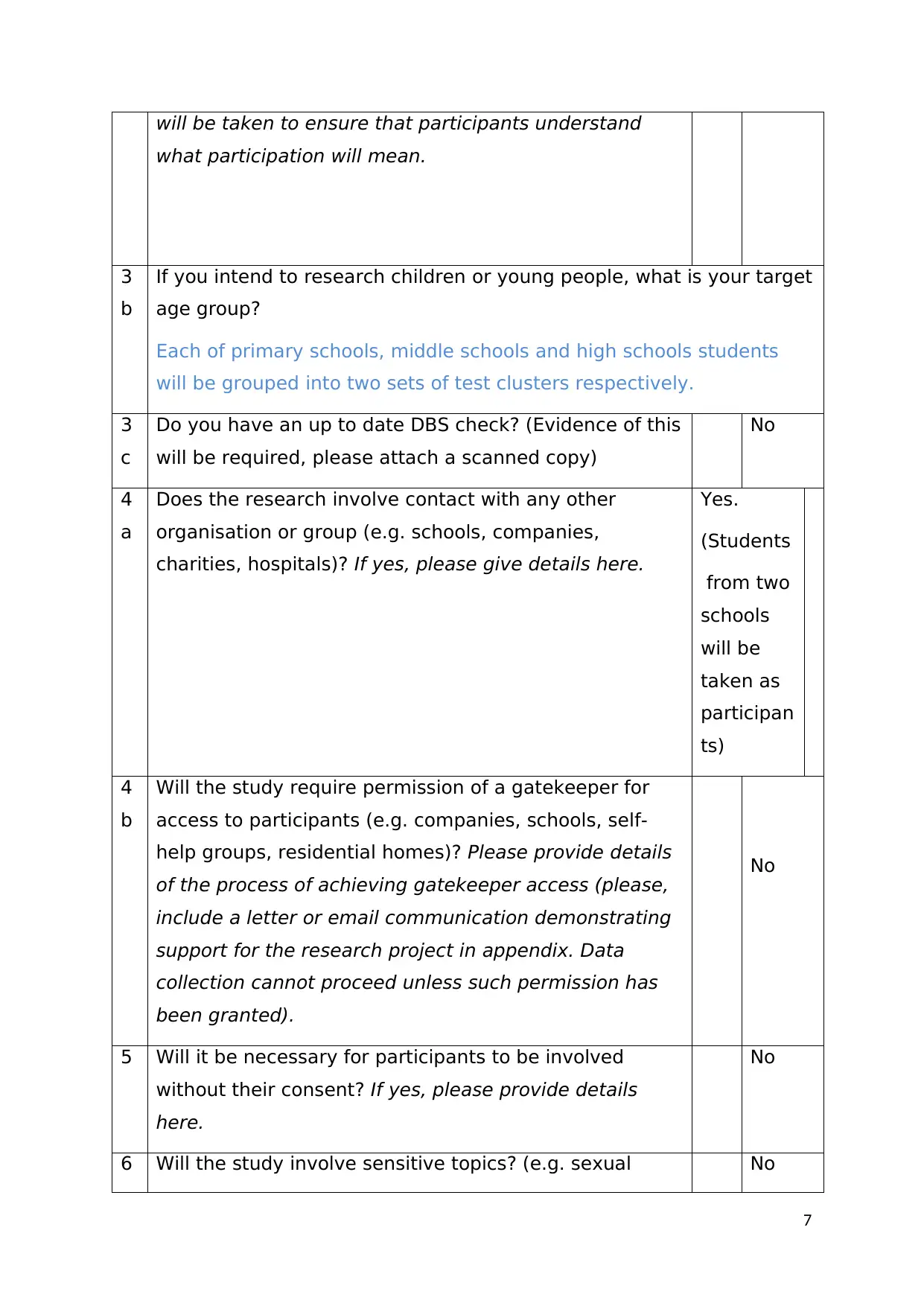
will be taken to ensure that participants understand
what participation will mean.
3
b
If you intend to research children or young people, what is your target
age group?
Each of primary schools, middle schools and high schools students
will be grouped into two sets of test clusters respectively.
3
c
Do you have an up to date DBS check? (Evidence of this
will be required, please attach a scanned copy)
No
4
a
Does the research involve contact with any other
organisation or group (e.g. schools, companies,
charities, hospitals)? If yes, please give details here.
Yes.
(Students
from two
schools
will be
taken as
participan
ts)
4
b
Will the study require permission of a gatekeeper for
access to participants (e.g. companies, schools, self-
help groups, residential homes)? Please provide details
of the process of achieving gatekeeper access (please,
include a letter or email communication demonstrating
support for the research project in appendix. Data
collection cannot proceed unless such permission has
been granted).
No
5 Will it be necessary for participants to be involved
without their consent? If yes, please provide details
here.
No
6 Will the study involve sensitive topics? (e.g. sexual No
7
what participation will mean.
3
b
If you intend to research children or young people, what is your target
age group?
Each of primary schools, middle schools and high schools students
will be grouped into two sets of test clusters respectively.
3
c
Do you have an up to date DBS check? (Evidence of this
will be required, please attach a scanned copy)
No
4
a
Does the research involve contact with any other
organisation or group (e.g. schools, companies,
charities, hospitals)? If yes, please give details here.
Yes.
(Students
from two
schools
will be
taken as
participan
ts)
4
b
Will the study require permission of a gatekeeper for
access to participants (e.g. companies, schools, self-
help groups, residential homes)? Please provide details
of the process of achieving gatekeeper access (please,
include a letter or email communication demonstrating
support for the research project in appendix. Data
collection cannot proceed unless such permission has
been granted).
No
5 Will it be necessary for participants to be involved
without their consent? If yes, please provide details
here.
No
6 Will the study involve sensitive topics? (e.g. sexual No
7
Paraphrase This Document
Need a fresh take? Get an instant paraphrase of this document with our AI Paraphraser
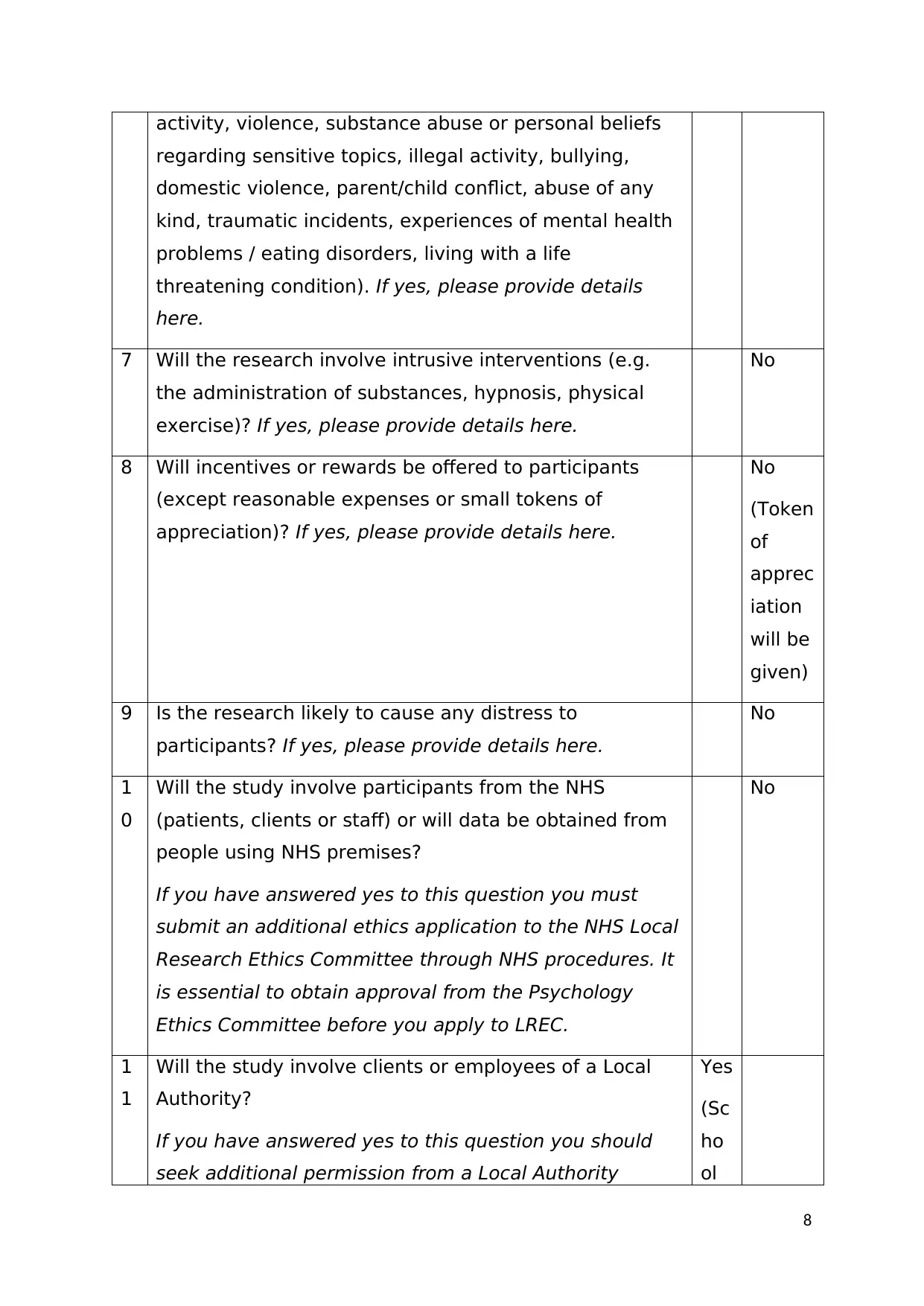
activity, violence, substance abuse or personal beliefs
regarding sensitive topics, illegal activity, bullying,
domestic violence, parent/child conflict, abuse of any
kind, traumatic incidents, experiences of mental health
problems / eating disorders, living with a life
threatening condition). If yes, please provide details
here.
7 Will the research involve intrusive interventions (e.g.
the administration of substances, hypnosis, physical
exercise)? If yes, please provide details here.
No
8 Will incentives or rewards be offered to participants
(except reasonable expenses or small tokens of
appreciation)? If yes, please provide details here.
No
(Token
of
apprec
iation
will be
given)
9 Is the research likely to cause any distress to
participants? If yes, please provide details here.
No
1
0
Will the study involve participants from the NHS
(patients, clients or staff) or will data be obtained from
people using NHS premises?
If you have answered yes to this question you must
submit an additional ethics application to the NHS Local
Research Ethics Committee through NHS procedures. It
is essential to obtain approval from the Psychology
Ethics Committee before you apply to LREC.
No
1
1
Will the study involve clients or employees of a Local
Authority?
If you have answered yes to this question you should
seek additional permission from a Local Authority
Yes
(Sc
ho
ol
8
regarding sensitive topics, illegal activity, bullying,
domestic violence, parent/child conflict, abuse of any
kind, traumatic incidents, experiences of mental health
problems / eating disorders, living with a life
threatening condition). If yes, please provide details
here.
7 Will the research involve intrusive interventions (e.g.
the administration of substances, hypnosis, physical
exercise)? If yes, please provide details here.
No
8 Will incentives or rewards be offered to participants
(except reasonable expenses or small tokens of
appreciation)? If yes, please provide details here.
No
(Token
of
apprec
iation
will be
given)
9 Is the research likely to cause any distress to
participants? If yes, please provide details here.
No
1
0
Will the study involve participants from the NHS
(patients, clients or staff) or will data be obtained from
people using NHS premises?
If you have answered yes to this question you must
submit an additional ethics application to the NHS Local
Research Ethics Committee through NHS procedures. It
is essential to obtain approval from the Psychology
Ethics Committee before you apply to LREC.
No
1
1
Will the study involve clients or employees of a Local
Authority?
If you have answered yes to this question you should
seek additional permission from a Local Authority
Yes
(Sc
ho
ol
8
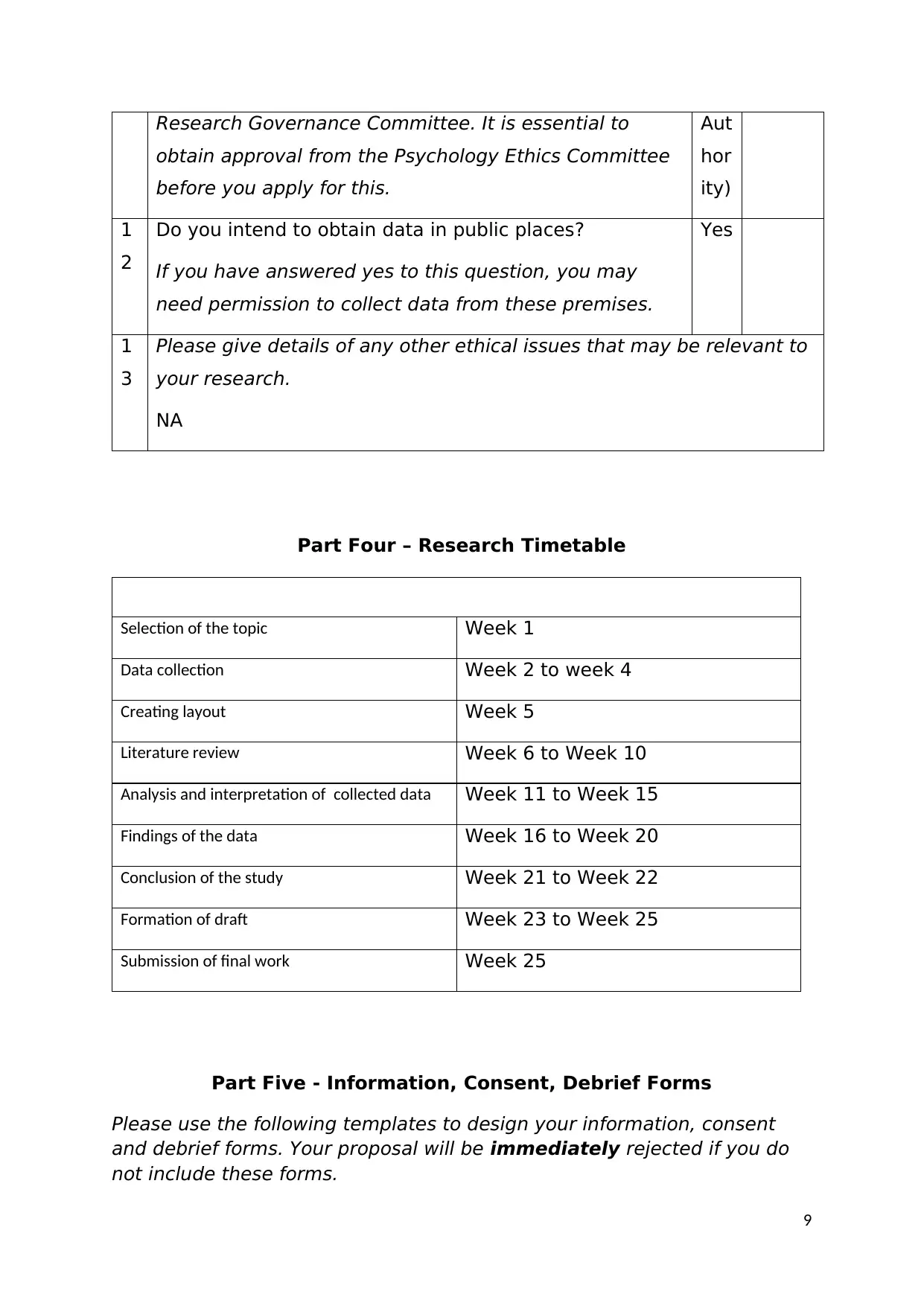
Research Governance Committee. It is essential to
obtain approval from the Psychology Ethics Committee
before you apply for this.
Aut
hor
ity)
1
2
Do you intend to obtain data in public places?
If you have answered yes to this question, you may
need permission to collect data from these premises.
Yes
1
3
Please give details of any other ethical issues that may be relevant to
your research.
NA
Part Four – Research Timetable
Selection of the topic Week 1
Data collection Week 2 to week 4
Creating layout Week 5
Literature review Week 6 to Week 10
Analysis and interpretation of collected data Week 11 to Week 15
Findings of the data Week 16 to Week 20
Conclusion of the study Week 21 to Week 22
Formation of draft Week 23 to Week 25
Submission of final work Week 25
Part Five - Information, Consent, Debrief Forms
Please use the following templates to design your information, consent
and debrief forms. Your proposal will be immediately rejected if you do
not include these forms.
9
obtain approval from the Psychology Ethics Committee
before you apply for this.
Aut
hor
ity)
1
2
Do you intend to obtain data in public places?
If you have answered yes to this question, you may
need permission to collect data from these premises.
Yes
1
3
Please give details of any other ethical issues that may be relevant to
your research.
NA
Part Four – Research Timetable
Selection of the topic Week 1
Data collection Week 2 to week 4
Creating layout Week 5
Literature review Week 6 to Week 10
Analysis and interpretation of collected data Week 11 to Week 15
Findings of the data Week 16 to Week 20
Conclusion of the study Week 21 to Week 22
Formation of draft Week 23 to Week 25
Submission of final work Week 25
Part Five - Information, Consent, Debrief Forms
Please use the following templates to design your information, consent
and debrief forms. Your proposal will be immediately rejected if you do
not include these forms.
9
⊘ This is a preview!⊘
Do you want full access?
Subscribe today to unlock all pages.

Trusted by 1+ million students worldwide

10
Paraphrase This Document
Need a fresh take? Get an instant paraphrase of this document with our AI Paraphraser
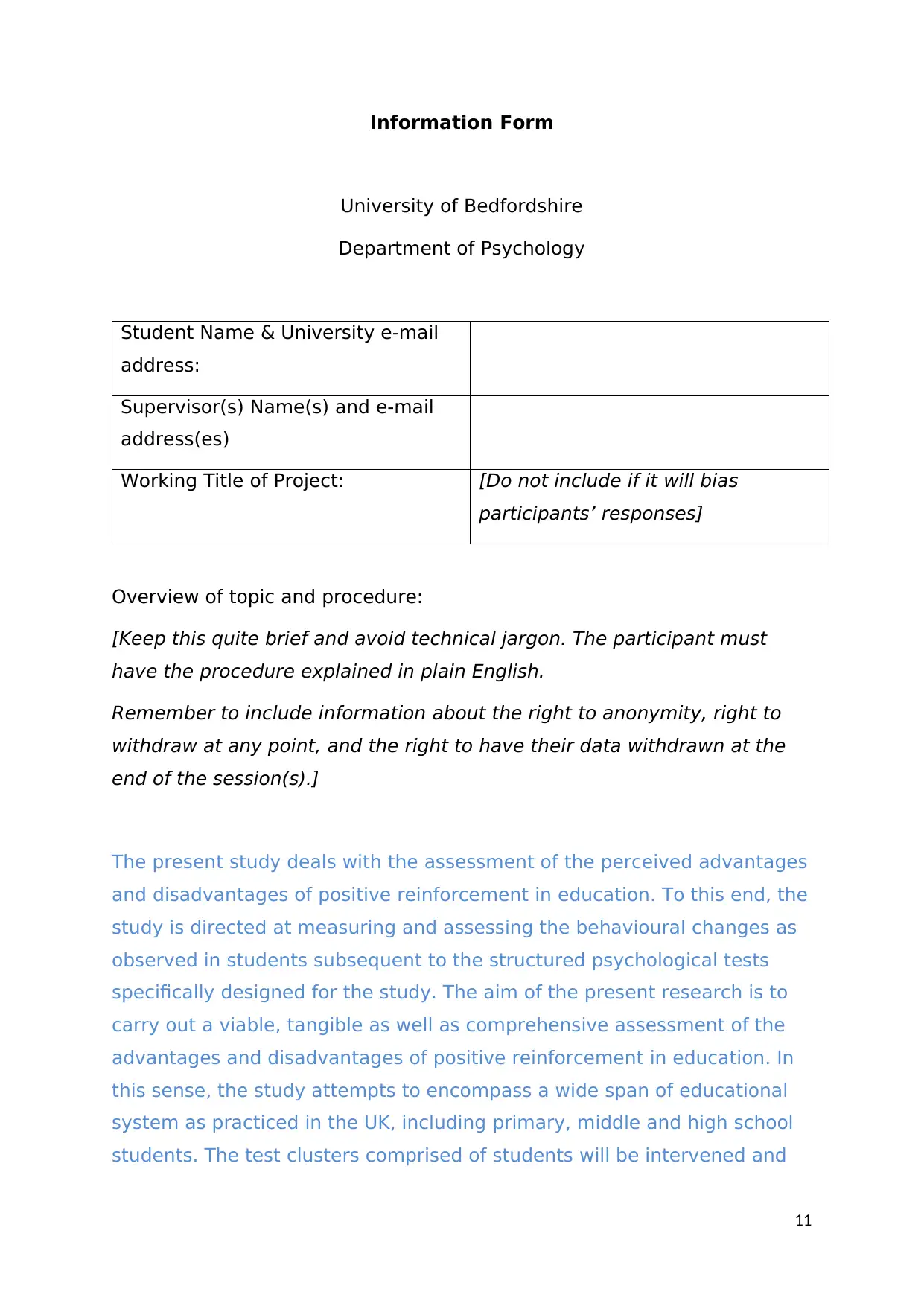
Information Form
University of Bedfordshire
Department of Psychology
Student Name & University e-mail
address:
Supervisor(s) Name(s) and e-mail
address(es)
Working Title of Project: [Do not include if it will bias
participants’ responses]
Overview of topic and procedure:
[Keep this quite brief and avoid technical jargon. The participant must
have the procedure explained in plain English.
Remember to include information about the right to anonymity, right to
withdraw at any point, and the right to have their data withdrawn at the
end of the session(s).]
The present study deals with the assessment of the perceived advantages
and disadvantages of positive reinforcement in education. To this end, the
study is directed at measuring and assessing the behavioural changes as
observed in students subsequent to the structured psychological tests
specifically designed for the study. The aim of the present research is to
carry out a viable, tangible as well as comprehensive assessment of the
advantages and disadvantages of positive reinforcement in education. In
this sense, the study attempts to encompass a wide span of educational
system as practiced in the UK, including primary, middle and high school
students. The test clusters comprised of students will be intervened and
11
University of Bedfordshire
Department of Psychology
Student Name & University e-mail
address:
Supervisor(s) Name(s) and e-mail
address(es)
Working Title of Project: [Do not include if it will bias
participants’ responses]
Overview of topic and procedure:
[Keep this quite brief and avoid technical jargon. The participant must
have the procedure explained in plain English.
Remember to include information about the right to anonymity, right to
withdraw at any point, and the right to have their data withdrawn at the
end of the session(s).]
The present study deals with the assessment of the perceived advantages
and disadvantages of positive reinforcement in education. To this end, the
study is directed at measuring and assessing the behavioural changes as
observed in students subsequent to the structured psychological tests
specifically designed for the study. The aim of the present research is to
carry out a viable, tangible as well as comprehensive assessment of the
advantages and disadvantages of positive reinforcement in education. In
this sense, the study attempts to encompass a wide span of educational
system as practiced in the UK, including primary, middle and high school
students. The test clusters comprised of students will be intervened and
11

supervised by their respective teachers. The participation will be entirely
voluntary and the participating teachers will be fully debriefed regarding
the purpose and objective of the study. The feedbacks and reports
collected from both the students and teachers will be kept anonymous
and completely confidential. However, all the participants are entitled to
revoke their feedback and withdraw from the study as per their will.
12
voluntary and the participating teachers will be fully debriefed regarding
the purpose and objective of the study. The feedbacks and reports
collected from both the students and teachers will be kept anonymous
and completely confidential. However, all the participants are entitled to
revoke their feedback and withdraw from the study as per their will.
12
⊘ This is a preview!⊘
Do you want full access?
Subscribe today to unlock all pages.

Trusted by 1+ million students worldwide
1 out of 16
Related Documents
Your All-in-One AI-Powered Toolkit for Academic Success.
+13062052269
info@desklib.com
Available 24*7 on WhatsApp / Email
![[object Object]](/_next/static/media/star-bottom.7253800d.svg)
Unlock your academic potential
Copyright © 2020–2026 A2Z Services. All Rights Reserved. Developed and managed by ZUCOL.




